How to Block a Website on Chrome Android
10 Chrome browser alternatives for Android
Just because almost everyone else uses Google's Chrome browser on their Android smartphone doesn't mean you have to.

IDG
10 smart browser alternatives to Chrome for Android
Just because almost everyone else uses Google's Chrome browser on their Android smartphone, doesn't mean you have to. There plenty of alternatives in the Play Store, some of them tailored for specific tasks. Here are some of our faves.

IDG
Ghostery Privacy Browser
Ghostery started life as a privacy-protecting extension for desktop browsers. On Android, its developers decided to present it as a browser. At its heart is a tracker blocker, a tool that prevents advertising and audience measurement networks from profiling you as you move around the web: that's ideal if you don't want your business and private personas linked. Ghostery makes it easy to prevent certain services from following you and allows you to turn off all the 2,200 trackers and 4,500 scripts it knows about. In keeping with its privacy theme, it doesn't ask for too many permissions: just location, photos/media/files, and Wi-Fi connection information. It includes a private browsing function called "Ghost Mode." Ghostery Privacy Browser is free, and runs on Android 4.0.3 and higher.
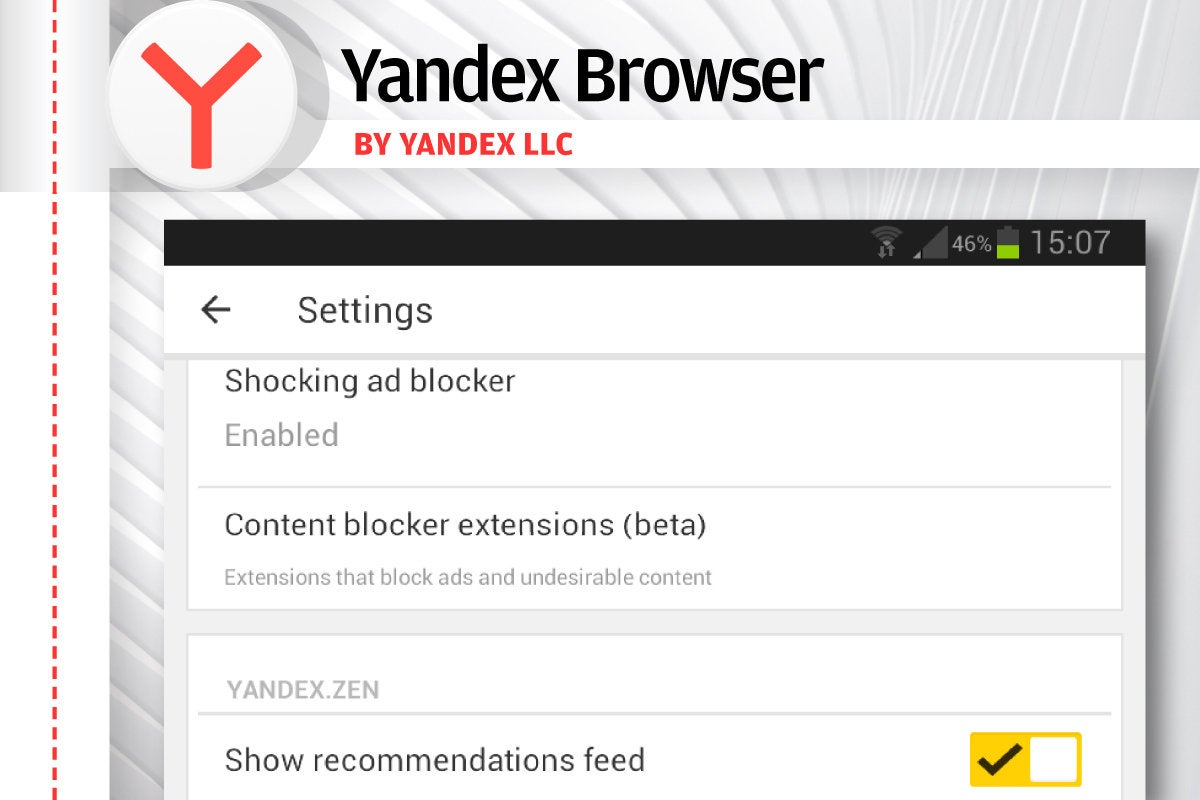
IDG
Yandex Browser
Yandex is Russia's answer to Google, and its browser draws deeply on the search engine's technology to power its stand-out features. These include buttons on the launch page that take you straight to your favorite sites, and a "turbo mode" that accelerates downloads over slow connections by compressing data and downscaling images before they are sent. Its most unusual function is Zen, a bottomless news feed that adapts to your interests. Yandex Browser is free, and runs on versions of Android going back at least as far as 4.1.2.
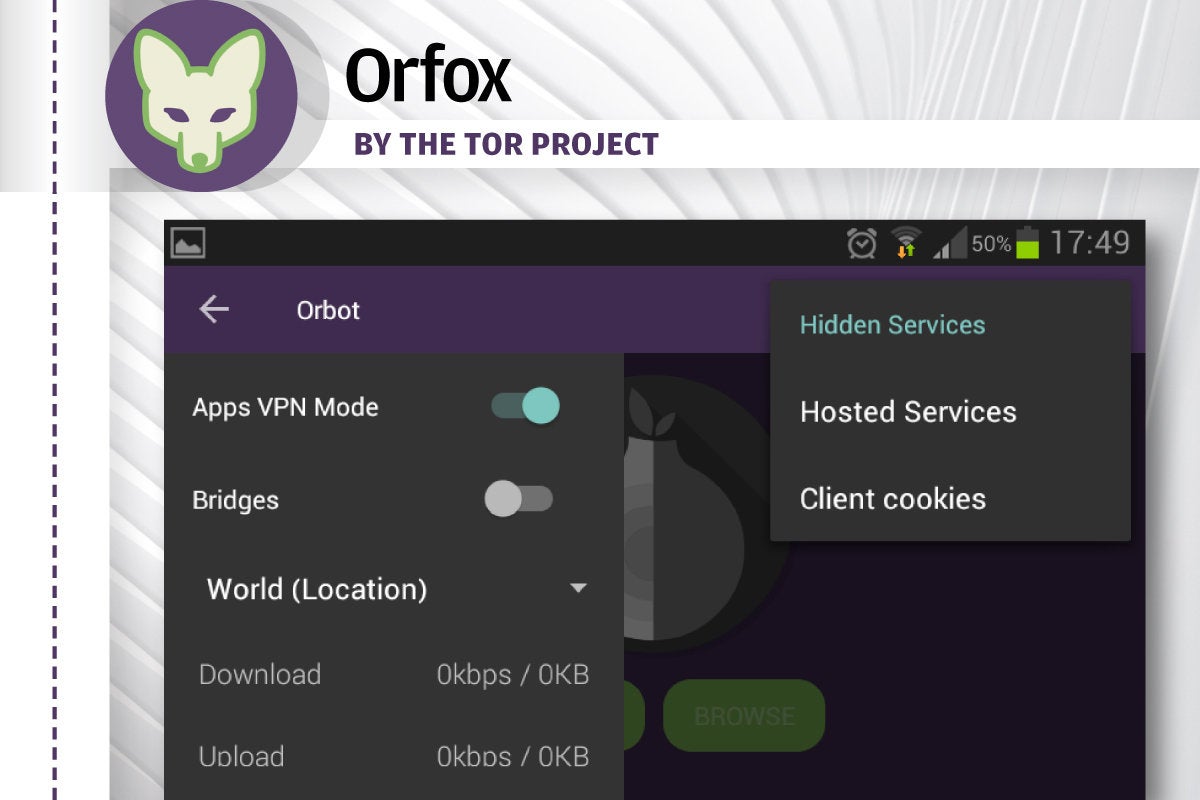
IDG
Orfox
Tor, formerly The Onion Router, is a distributed system for anonymizing internet traffic developed by The Tor Project. The Orfox browser, based on Firefox, sends your web traffic through Tor using another app, Orbot: Proxy with Tor. It can hide what you're browsing from your ISP, and withhold your IP address from the websites you visit. They'll still know who you are if you log in with Facebook Connect, though…. Orbot doesn't just work with Orfox: It can be set to launch at the same time as other apps, so they can use it as a VPN connection too. Orfox asks for access to your device/app history and to your photos/media/files, and runs on Android 4.0.3 and up. Orbot requires access to your photos/media/files and to device ID and call information, and runs on Android 4.1 and up. Both apps are free.
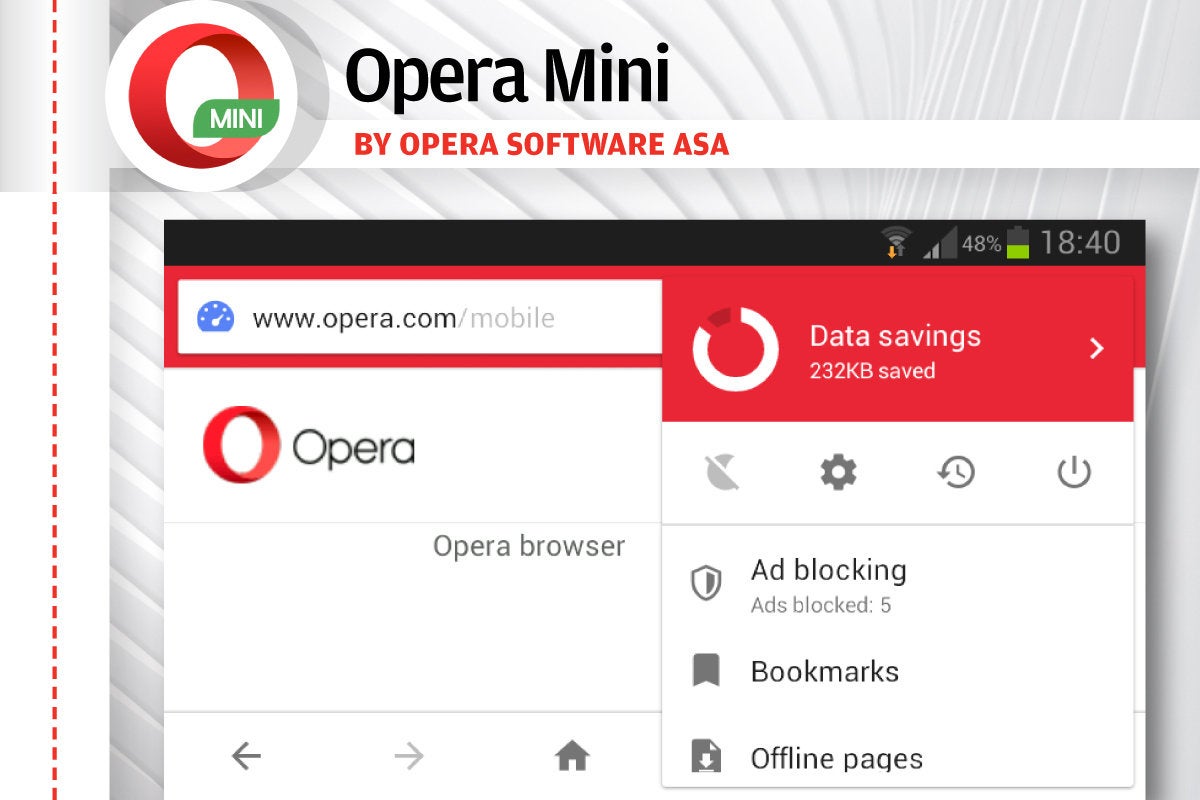
IDG
Opera Mini
Opera Mini was originally developed to cut data usage and speed page loading on feature phones and low-end smartphones, but Android smartphone owners can appreciate its speed and efficiency, too. In addition to its compression function, which uses a web proxy run by Opera, the browser also includes a night-time mode to reduce brightness while browsing in the dark, and can delay large file downloads until you're using a Wi-Fi connection. The browser includes an ad-blocker, but doesn't block all ads, choosing to display those from Facebook's ad network. Opera Mini is free, and runs on versions of Android going back at least as far as 4.1.2.
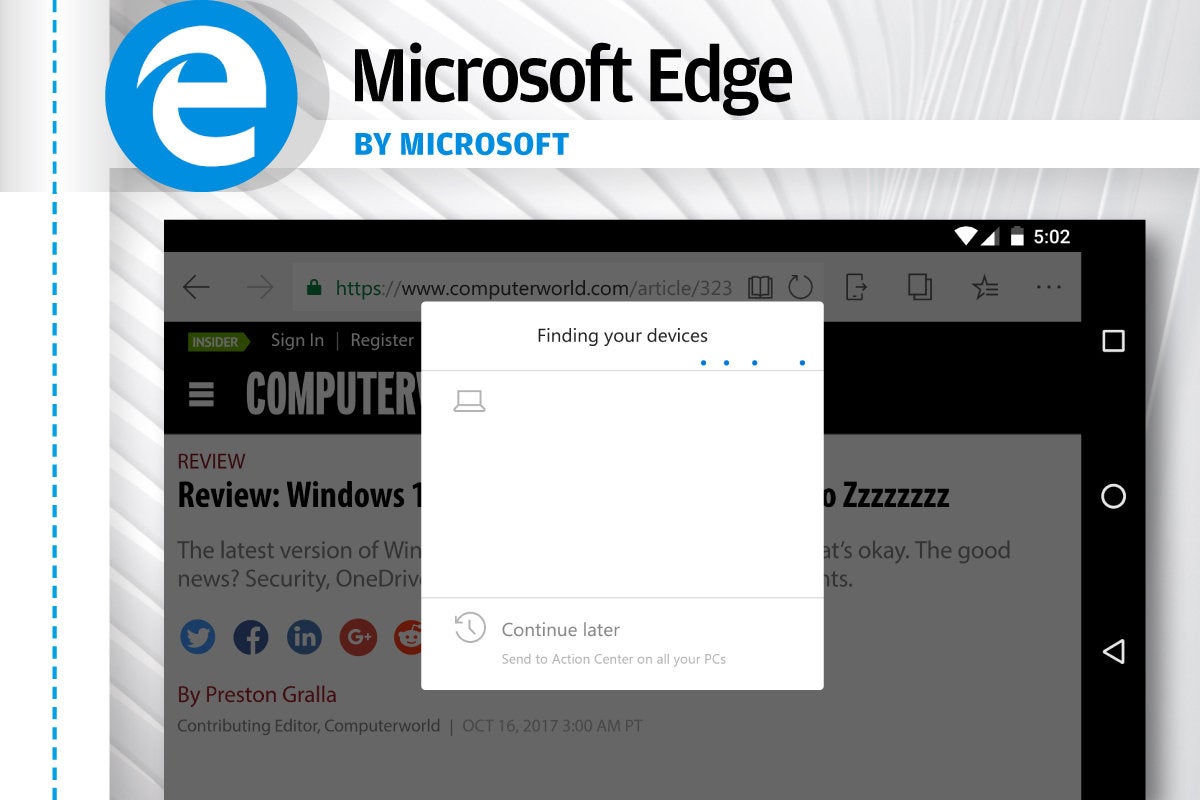
IDG
Microsoft Edge
Yes, the Microsoft browser that hardly anyone uses on Windows is coming to Android as well. The key feature Microsoft promises is Continue on PC, which allows you to begin reading a web page or filling in a form in Edge on your smartphone, and finish the task in Edge on a PC running the Windows 10 Fall Creators Update. Edge will sync favorites and passwords between all your devices logged into Microsoft's cloud servers. And finally, Microsoft says it will have a built-in QR code scanner, voice search and a mode it calls InPrivate to keep your browsing data private. Edge is free, and runs on Android 4.4 and up.
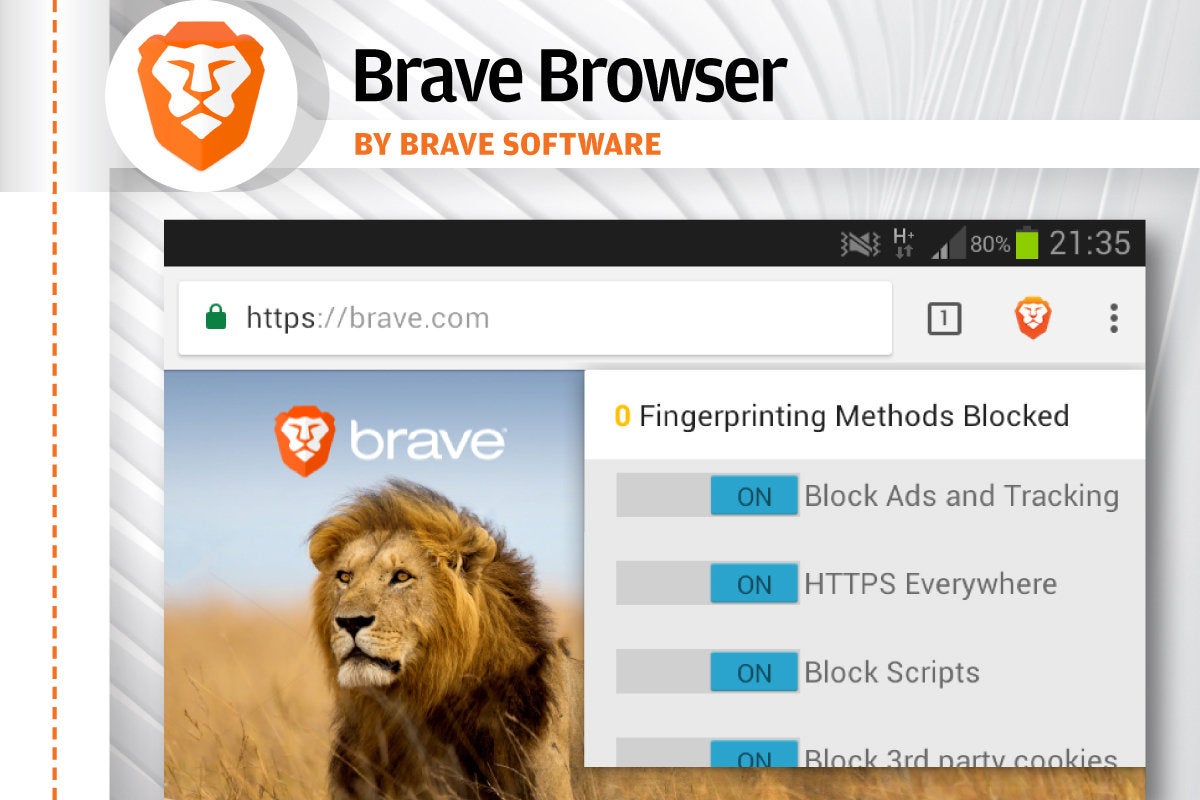
IDG
Brave Browser
Brave isn't just trying to change browsing, it's trying to change publishing. It's big on privacy and security, enforcing HTTPS Everywhere and blocking scripts, pop-ups, third-party cookies, ads and trackers. Having done away with ads, though, it offers a new way of funding websites: the Basic Attention Token (BAT). Users can make a monthly payment to Brave to buy a number of BATs, which are then redistributed among all the websites participating in the program. The payout websites receive is determined by the generosity and frequency of their visitors. Brave is free, and runs on Android 4.1 and later.

IDG
Firefox Focus
Firefox Focus, as its name suggests, is a version of Firefox with a focus – in this case on protecting privacy. It automatically blocks trackers, and offers easy ways to delete passwords and cookies without having to fiddle with settings. It also blocks ads, something that the Mozilla Foundation says will speed up page downloads. Without control over the function, though, that may mean there are some sites you can't visit. Firefox Focus is free, and will run on Android 5.0 and later.
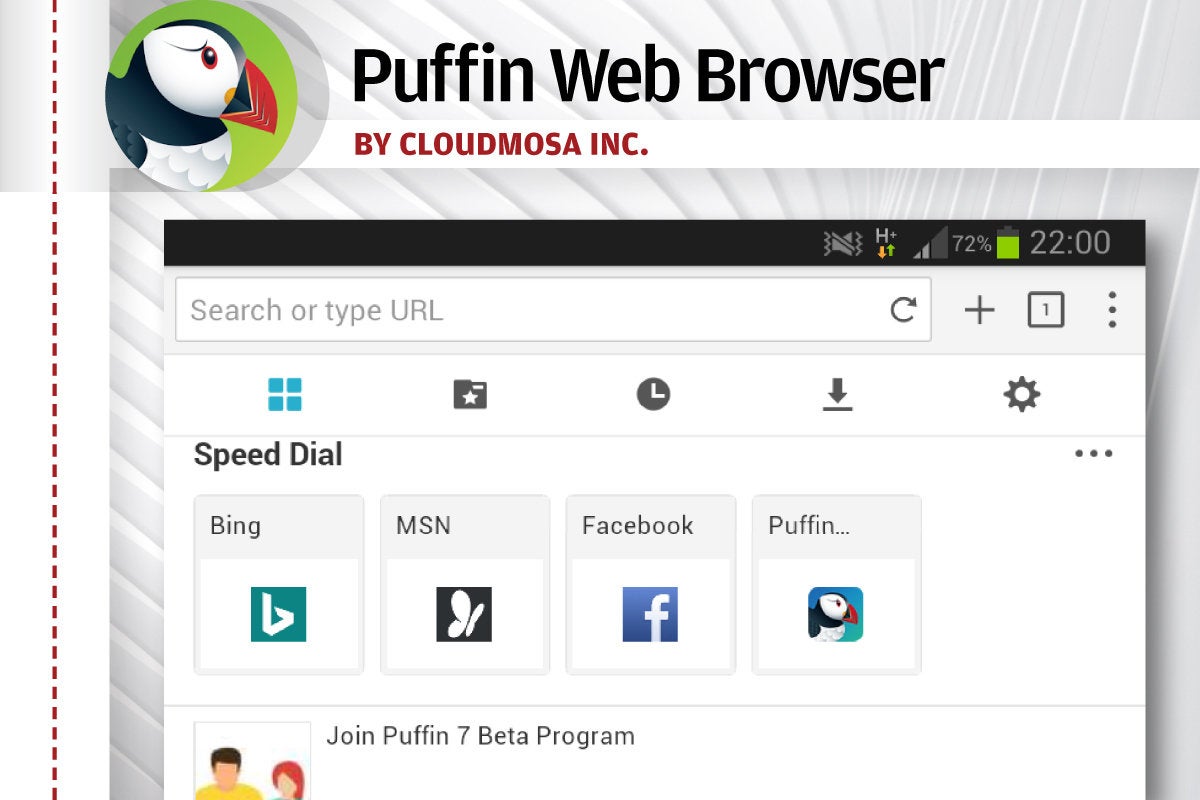
IDG
Puffin Web Browser
Flash is apparently still a thing in some organizations. If yours is one of them, you can use Puffin Web Browser to access pages coded in Flash. Like Opera Mini, Puffin routes web traffic through proxy servers (Puffin's are in the U.S. and Singapore) that compress graphics to reduce data usage and page download times. This is handy if you want to "bookmark" a file to read at the office later, as you can use Puffin's "download to cloud" function to transfer the file directly to Google Drive without having to store it on your phone first. On the other hand, it means you have to trust Puffin's proxy server with the login details to any site you visit. There's one other wrinkle: Where other browsers promise to remove ads, this app is "ad-supported" -- Puffin fans that don't want its ads will have to pay $3.99/€4.49 for Puffin Browser Pro, which is not ad-supported. Puffin Web Browser is free and runs on Android 4.0 and later.
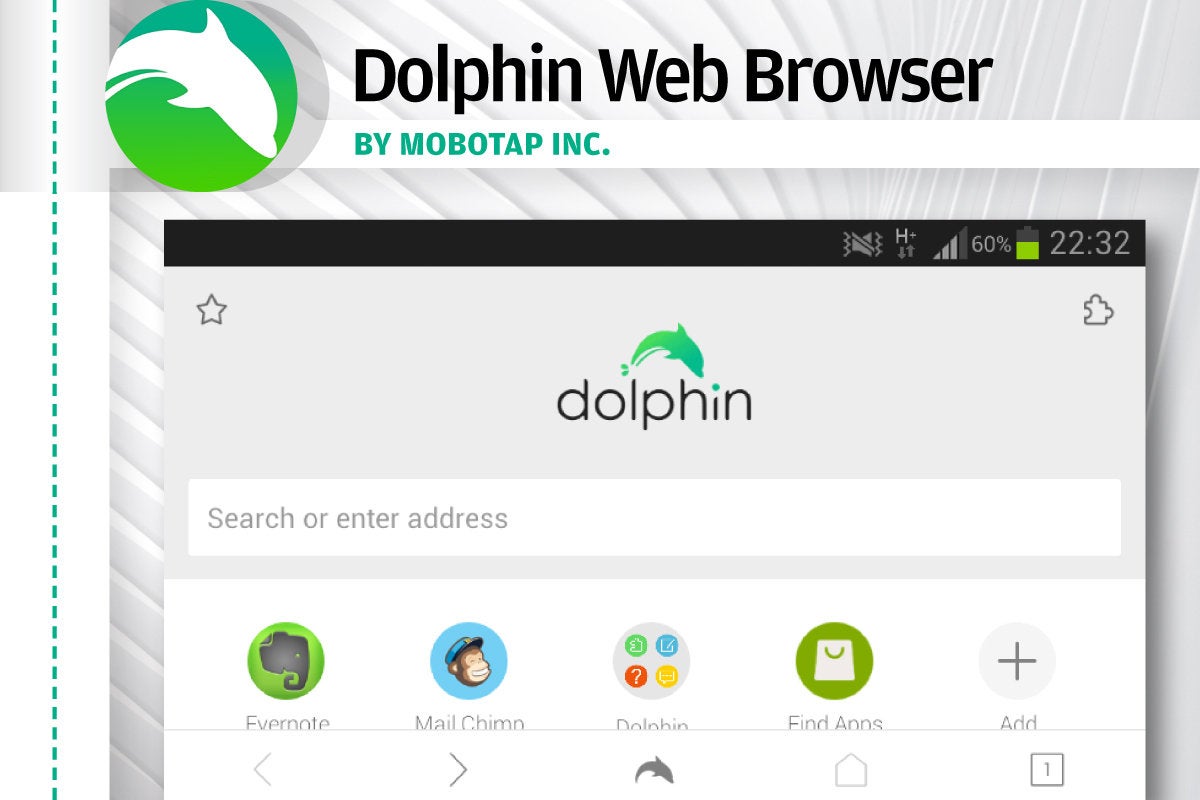
IDG
Dolphin Web Browser
This browser has one of the longest features of any of the mobile browsers. You can tell Dolphin where you want to go by tapping on one of its speed-dial buttons, by selecting a destination from the bookmarks, history or open tabs it has synchronized with your PC, or by typing its address. You can also use touch gestures to select favorite destinations, perhaps tracing a C for Computerworld.com and, if that's not enough, with the 99-cent Dolphin Sonar add-on you can control the browser by shaking your phone or speaking to it. There's also a Flash player, an ad and pop-up blocker, and an incognito browsing mode. Dolphin Web Browser is free, and runs on Android versions going back at least as far as 4.1.2.

IDG
Webroot SecureWeb Browser
If you want some of the protection offered by Webroot's mobile security products, but don't want to pay for the whole thing, you can try the free Webroot SecureWeb Browser. Logically enough, this doesn't protect all applications accessing the internet on your device, but only scans the sites you browse using it. It promises to identify malicious websites and phishing pages before you visit them, using its cloud service to check the reputation of URLs against its database. You can see how well your web browser blocks malicious content using the Anti-Malware Testing Standards Organization's security features check. Webroot SecureWeb Browser is free, and runs on Android 4.0 and later.
Copyright © 2017 IDG Communications, Inc.
How to Block a Website on Chrome Android
Source: https://www.computerworld.com/article/3234189/10-chrome-browser-alternatives-for-android.html